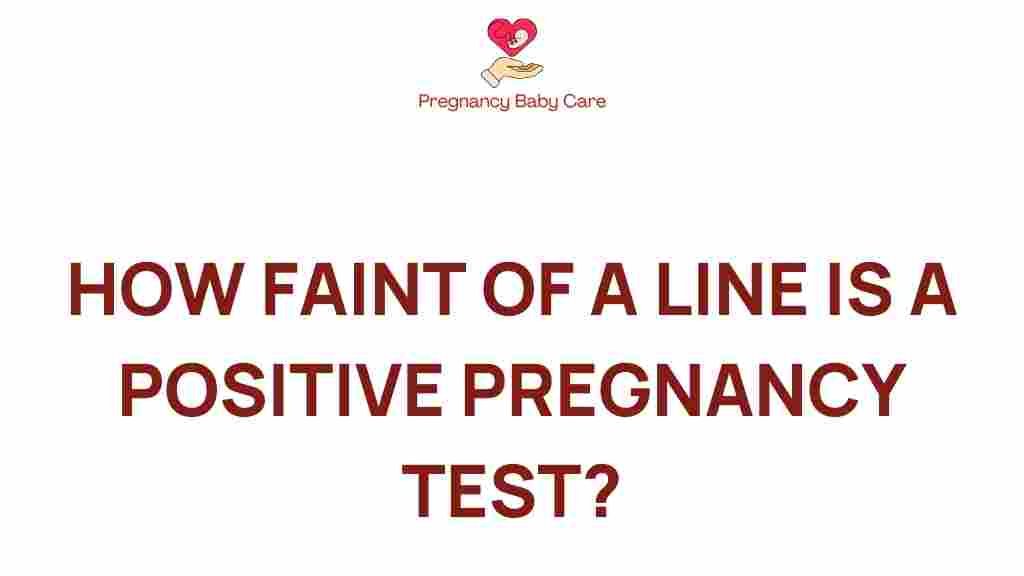The Mysterious Faint Line: What It Means for Your Pregnancy Test
When you’re trying to conceive, the anticipation of a positive pregnancy test can be both exciting and nerve-wracking. One of the most common scenarios many women face is seeing a faint line on their pregnancy test. This faint line can lead to confusion and uncertainty about whether it indicates a positive result or not. In this article, we will delve into the meaning of a faint line on a pregnancy test, how it relates to hormone levels, early detection, and the accuracy of home testing. We will also provide troubleshooting tips and guidance for interpreting your results.
Understanding Pregnancy Tests
Pregnancy tests are designed to detect the hormone human chorionic gonadotropin (hCG) in your urine. This hormone is produced shortly after a fertilized egg attaches to the uterine lining. Here’s what you need to know about how these tests work:
- Home Testing: Most pregnancy tests available at pharmacies are home testing kits that allow you to check for pregnancy easily.
- Early Detection: Some tests claim to detect pregnancy even before your missed period, often relying on very low levels of hCG.
- Testing Accuracy: Home pregnancy tests are generally accurate when used correctly, particularly after a missed period.
What Does a Faint Line Mean?
A faint line on your pregnancy test can indicate several things:
- Positive Result: A faint line can mean that you are pregnant, especially if it appears within the time frame specified in the test instructions.
- Low Hormone Levels: If you take the test very early, your hCG levels might be too low to produce a strong line, resulting in a faint line.
- Evaporation Line: Sometimes, a line that appears after the recommended time frame is an evaporation line, not an actual positive result.
Factors Influencing Faint Lines
Several factors can influence the appearance of a faint line on your pregnancy test:
1. Timing of the Test
Taking a test too early after ovulation can lead to low hCG levels, resulting in a faint line. It’s often recommended to wait until at least the first day of your missed period for the most accurate results.
2. Sensitivity of the Test
Different pregnancy tests have different sensitivities. Some are designed to detect lower levels of hCG, while others require higher concentrations for a positive result. Always check the sensitivity of the test you are using.
3. Dilution of Urine
If you drink a lot of fluids before taking the test, your urine may be diluted, leading to lower hCG concentrations and a faint line. It’s best to use the first morning urine for testing, as it typically contains the highest concentration of hCG.
Step-by-Step Process for Testing
Follow this guide to ensure you get the most accurate results from your pregnancy test:
- Choose the Right Test: Select a test that is known for its accuracy and sensitivity.
- Read the Instructions: Carefully read the instructions provided with the test to understand how to use it properly.
- Test Timing: Wait until the first day of your missed period for the best results. If testing earlier, morning urine is recommended.
- Collect Urine Sample: Use the collection method stated in the instructions, whether it’s a midstream test or a dip test.
- Wait for Results: Follow the recommended waiting time to read the results, usually between 1 to 5 minutes.
- Interpret the Results: Look for the control line and test line. A faint line next to a strong control line usually indicates a positive result.
Troubleshooting Tips for Faint Lines
If you see a faint line on your pregnancy test, consider these troubleshooting tips:
- Retest Later: If you suspect you may be pregnant, wait a couple of days and retest. hCG levels increase rapidly in early pregnancy.
- Use Different Tests: Try a different brand of pregnancy test. Some tests might be more sensitive than others.
- Consult a Healthcare Provider: If you continue to see faint lines or have questions, consult your doctor for a blood test, which can provide more accurate results.
When to Seek Medical Advice
It’s essential to seek medical advice in the following situations:
- If you experience any unusual pregnancy symptoms, such as severe cramping or bleeding.
- If your test results are inconsistent (some positive, some negative).
- If you have a faint line and continue to test negative after a few days.
Understanding Pregnancy Symptoms
In addition to testing, being aware of pregnancy symptoms can help you determine if you might be pregnant. Common early pregnancy symptoms include:
- Missed Period: The most obvious sign that you might be pregnant.
- Nausea: Often referred to as morning sickness, this can occur at any time of day.
- Fatigue: Increased tiredness is common in early pregnancy due to hormonal changes.
- Frequent Urination: As the uterus expands, it can put pressure on the bladder.
- Sore Breasts: Hormonal changes can lead to breast tenderness and swelling.
Conclusion
A faint line on your pregnancy test can be a source of confusion, but it does not always indicate a negative result. Understanding the factors that influence testing accuracy, hormone levels, and timing can help clarify your situation. If you see a faint line, consider repeating the test after a few days or consult a healthcare provider for further guidance. Remember, early detection can be vital, and your health is paramount. For more information on pregnancy tests and early detection, check out this comprehensive guide.
Your journey to understanding your pregnancy test results is critical, and being informed can empower you to take the next steps with confidence.
This article is in the category Pregnancy and created by PregnancyBabyCare Team
